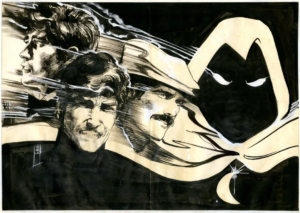Sign up to get this as an email newsletter via Substack: As in Guillotine | The Newsletter.
_ONE
Ryan Coogler Put ‘Wakanda Forever’ in the Hands of Black Women—And It Paid Off | Scott Woods
I wish I would tell someone I skipped Chadwick Boseman’s funeral, which is what a lot of Wakanda Forever is. It is service and hymn and repast. It is, as T’Challa’s family does in the movie, a burning of the funeral garment to move from mourning to fruitful remembrance.
Scott Woods is one of my favorite cultural critics, and one of a handful of people I’ll truly miss on Twitter… but thanks to Feedly, I was able to create an RSS feed for his Authory site so I can keep up with his writing. His take on Wakanda Forever is a great read and puts into words some of what I felt while, and after, watching it.
Like the first one, the sequel unfairly carries even more unique burdens other MCU movies don’t ever have to think about, but Coogler arguably delivered an even better movie this time, on every metric, and capped it off with a new Rihanna song! It’s definitely the best Phase Four effort so far, hands down, low bar that may be.
He took a heavier tone than I expected, especially with how different characters deal with grief and revenge — explicitly rebuking any belief that Killmonger was a hero, even in jest — and he makes Namor an interesting character by completely reframing his cultural background. There’s even a silly joke about his name that I can’t believe made it on screen! Most importantly, it handles T’Challa’s loss perfectly, weaving it into the very heart of the story, while also serving as an emotional farewell to the man who brought him to life, Chadwick Boseman. Between the emotional tributes to Boseman and Angela Bassett acting like she was in a Scorsese movie, if the first one was a Best Picture candidate (debatable, IMO), then this one is a shoo-in for a few more big nominations.
Adding to its own emotional weight, it was my first time back in a theater in 2.5 years — and it was totally worth sitting in a mask for 3 hours, partly thanks to a spacious, recently renovated theater. I’m not sure there’s another movie coming out that will tempt me back anytime soon, although I haven’t seen a trailer for Fast X yet…
__TWO
Fleeing Twitter — The “Twexodus” — is About White Liberal Fragility | Tim Wise
And anecdotally — but with lots of qualitative data points — I can tell you: it is white folks who seem most concerned about the increasing toxification of Twitter under Musk’s leadership. This, even as it will be disproportionately not white people who bear the brunt of that toxicity. I don’t see Black Twitter — that collective body of Black creators and thinkers who have used the platform to push back against racism, both online and IRL — talking about bolting.
I don’t know anything about Tim Wise’s background, but I’m leery of the growing cottage industry that’s been built around “anti-racist education,” especially efforts driven by white people. While the underlying intentions are usually good — particularly White people taking on responsibility to educate other White people about the racism they’ve benefitted from their entire lives — most of the examples I’ve seen of the actual work they do are performative and/or lack accountability mechanisms or metrics. Every press release about a company’s continued lack of diversity loves to mention them, though!
There are myriad legitimate reasons to abandon Twitter right now, and just as many to stay put. Arguing that “White Liberals” — an overly broad and ultimately meaningless term — should stay in solidarity with Black Twitter — a similarly broad term representing multiple overlapping communities, and different ones to different people — feels like the kind of op-ed full of anecdata and personal benchmarking the New York Times regularly gets clowned for publishing, which is probably why it’s on Medium instead. It’s practically begging for a Shaun King-led fundraising initiative as a follow-up!
Nevertheless, it’s being passed around by otherwise smart people as an allegedly important part of the discourse, but I found nothing redeeming or insightful in it. Twitter is a very useful communications tool, but it’s not sacred ground, and neither Black Twitter nor White Liberals are monolithic communities. The overlapping communities that drive Black Twitter existed elsewhere before and will continue to exist if/when Twitter falls apart, regardless of what White Liberals choose to do.
The main difference might be this is the first time those communities were easily visible and monetizable to White Liberals, and its loss would make it a lot harder for some to hang a digital shingle and sell themselves as allies, or educators-for-hire.
___THREE
Dollars to Megabits, You May Be Paying 400 Times As Much As Your Neighbor for Internet Service | Leon Yin and Aaron Sankin
These providers also disproportionately gave the worst offers to formerly redlined areas in every one of the 22 cities examined where digitized historical maps were available. These are areas a since-disbanded agency created by the federal government in the 1930s had deemed “hazardous” for financial institutions to invest in, often because the residents were Black or poor. Redlining was outlawed in 1968.
When we moved last summer, one town over and literally less than two miles away from our previous three addresses, GEICO raised our car insurance by 35%. Their excuse was that “claims history, the cost of parts of labor in the area as well as taking into account the cost of medical care in the area” were key factors.
But, the towns are in the same county, share borders with several other towns, and have similar demographics in all but two notable areas: median household income and race.

Redlining may have been outlawed in 1968, but its lingering effects can be seen everywhere from gerrymandered congressional districts to school funding to car insurance, and now, even internet service. “The future is already here – it’s just not evenly distributed.” (William Gibson, I think.)
But please, tell me more about why helping Elon Musk save Twitter is important for supporting Black people?
____FOUR
Accessible Comics??? | Abby Kingman
While alt text can be the right strategy for describing simple multi-panels or single panel comics, many webcomics have a bigger story to tell. And, quite often, the panels are presented in a single image, not as separate images. The best solution for making these comics accessible is to take a page from the time-based media (i.e. audio and video content) play book and add a transcript. Transcripts make your content available to screen readers, but also to braille output devices and search engine crawlers. They can also be easily translated, so your comic can be read by fans all around the world.
Accessibility is a big deal for libraries, and we periodically get questions at the day job about making the digital comics we offer accessible to screen readers. Unfortunately, for many reasons Kingman breaks down so well, it’s highly unlikely to ever happen for “legacy” comics — those created primarily for print formats — and more difficult than you might think for webcomics.
Doing it the right way would require publishers embrace and embed digital accessibility into their creation process from the very start — developing complete transcripts for every title, formatted like screenplays to align with each panel, with descriptive text for each image — and I just don’t see that happening, not even for their own consumer-facing digital platforms. While automated transcripts can probably easily recognize and transcribe text from each panel, I don’t believe AI is at the point where it can also describe what’s happening in each image, or even consistently identify the order text should be read in.
Without descriptions of what’s happening in each image, you’d only get one-third of the unique reading experience comics offer — text, images, text + images. I’m not convinced that’s better than nothing, but maybe it is?
_____FIVE
Watch Dogs Is The Most Accurate Cyberpunk Game Ever | Issy van der Velde
At the end of the day, most people use the technology they do out of convenience. If you need to replace your old iPhone, would you want the hassle of switching to an Android and having to transfer all your data manually or start from scratch? Or would you rather plug a new iPhone into your Mac and transfer everything over automatically in a few minutes? Everything being in the same ecosystem make things vulnerable, but it also makes them easy, and people will choose easy nine times out of ten.
I love a good RPG, so I had some mild interest in playing Cyberpunk 2077 when it was first announced, but its disastrous launch quickly took it off my radar. When it recently got patched to the point where it was deemed playable and reasonably engaging, I decided to finally check it out and have been relatively underwhelmed.
It’s a fine game, but neither the setting nor story are interesting enough to hold my attention for very long, which is bad for an RPG that offers myriad side quests, crafting, and skill tree options to dive into, and a convoluted story that’s easy to lose track of. At times, I found myself comparing it to Watch Dogs, mostly poorly except for its underlying story and lead character, V, being slightly more interesting than the incredibly dull Aiden Pearce’s quest for whatever he was on about.
van der Velde makes a really compelling argument for Watch Dogs being a more realistic cyberpunk game, though, and GVMERS’ “The Rise and Fall of Watch Dogs” reminded me how much it got right that now I want to play Watch Dogs 2 instead!
PS: As I mentioned a couple of months ago, Citizen Sleeper is the most interesting cyberpunk game I’ve ever played, and arguably the most “realistic” future we have to look forward to, assuming humanity lasts that long.
Do you like email?
Sign up here to get my bi-weekly "newsletter" and/or receive every new blog post delivered right to your inbox. (Burner emails are fine. I get it!)



